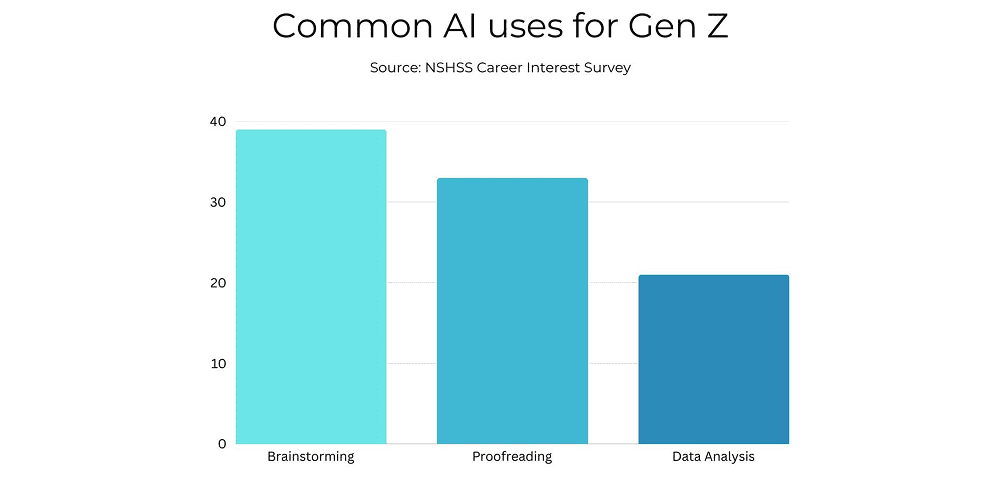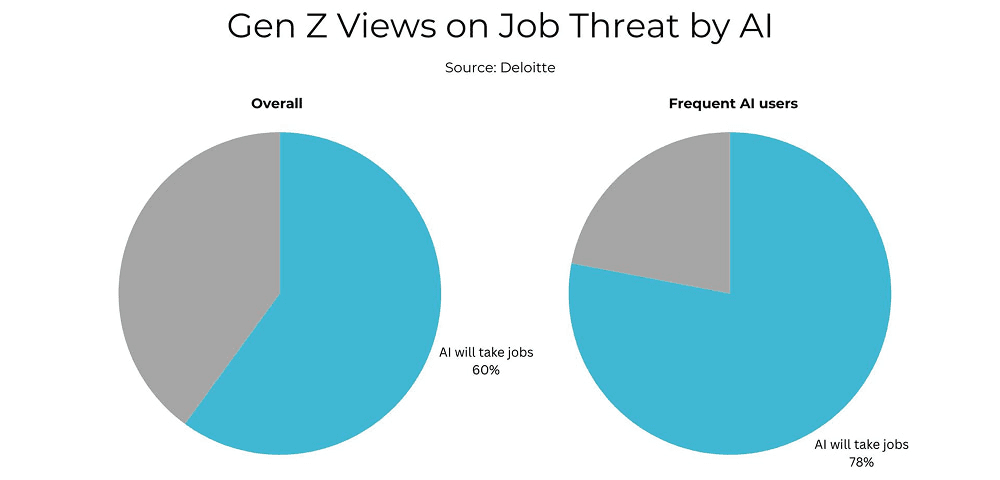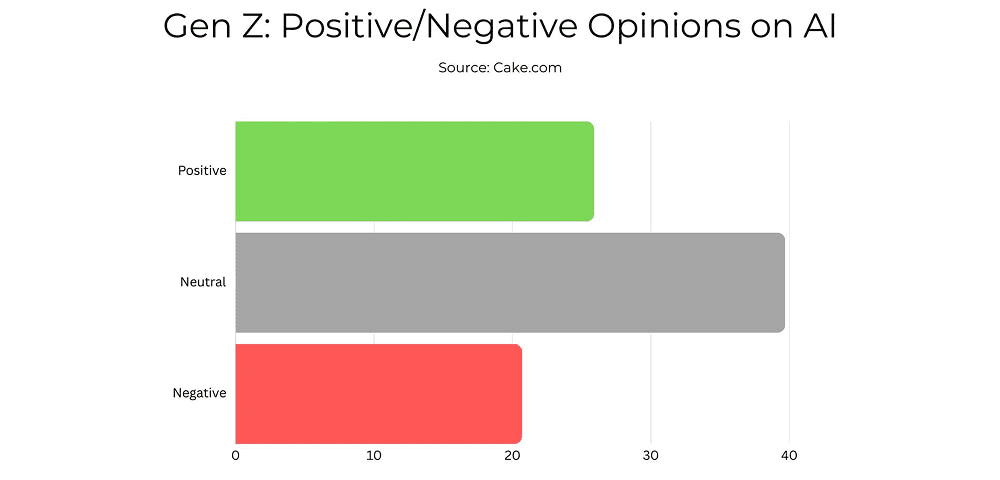- Home
- News & Industry Updates
- News
- Decoding Gen Z: Beyond The Hype, Gen Z’s Clear-eyed View Of Ai In The Workplace
Decoding Gen Z: Beyond the Hype, Gen Z’s Clear-Eyed View of AI in the Workplace
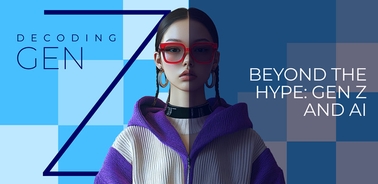
Young professionals at IE University see promise in AI—if it’s used to support, not replace, human thinking.
AI has swept the workforce. Today, 88% of companies use artificial intelligence for candidate screening, according to an article by the World Economic Forum. The WEF’s 2025 Future of Jobs report also indicates that 62% of employers plan to hire candidates with skills to work alongside AI.
However, according to an international business survey featured in Forbes, 37% of employers would hire AI rather than Gen Z candidates.
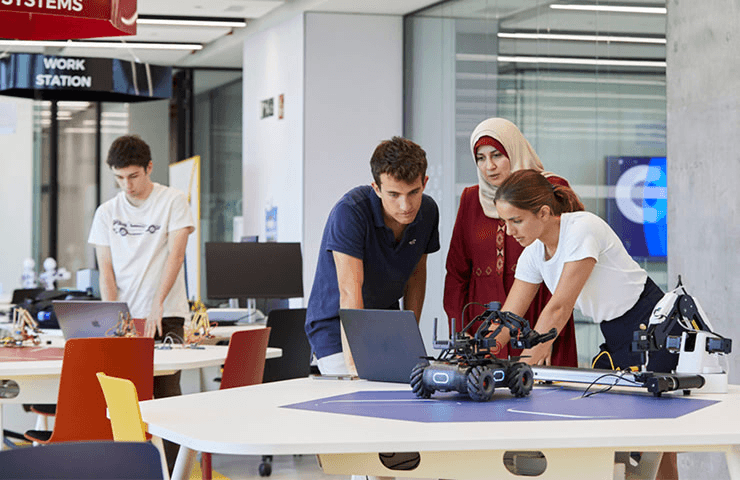
Gen Z shows remarkable ease when adopting AI in the face of fast-paced technological advancements, rapid innovation, and the shift in professional environments that society faces today. No longer an abstract concept, AI has infiltrated many different areas of people's lives. Recent statistics from the most recent NSHSS Career Interest Survey show that 49% of Gen Z uses AI to enhance their capabilities through brainstorming (39%), proofreading (33%), and data analysis (21%).
Nevertheless, the use of AI creates mixed feelings among Gen Zers. Overall, according to project management suite CAKE, 25.9% report feeling positively about AI, while 39.7% are neutral and 20.7% express negative feelings, revealing a complex dynamic between AI and Gen Z.
According to McKinsey’s 2025 on AI in the workplace, the next three years will see a rise in AI investment in 92% of companies. However, only 1% of leaders consider that AI is fully integrated into their workflows.
Drawing from IE University´s Gen Z student body, qualitative research conducted through focus groups by Talents & Careers has uncovered insights on a nuanced array of opinions, expectations and concerns surrounding AI usage in the workplace.
The future of jobs and the workplace
According to Deloitte’s 2025 survey, there is some concern amongst Gen Zers about AI taking jobs in the future: with 60% of Gen Z believing that AI will eliminate jobs, a figure that rises to 78% among those who use the technology regularly.
A generation that is comfortable with AI, Gen Z is not blind to the risks of becoming redundant in the face of this new technology.
"I think, like every other technological disruption, [the replacement of jobs] tends to happen,” said a fourth-year Bacherlor in Economics student, “once the technology is introduced, a process of creative destruction takes place, some jobs are going to be completely erased, other jobs are going to be created, and some jobs are going to require AI to be done better and faster."
Although concern varies across industries for Gen Zers, there is a general consensus that being well-versed in AI skills is a priority, and should be the responsibility of workplaces and institutions.
“Learning on the job is important, but if I'm already going into the workforce, and part of it is working with AI, I should already know how to work with AI,” said a fourth-year Bachelor in Computer Science and AI student. “That is why it’s great that we get a free ChatGPT Plus subscription during our studies.”
AI as a Tool: Practicality, not perfection
For many Gen Zers, AI offers convenience and productivity. It enables users to complete a series of time-consuming operations such as drafting emails, copywriting, summarizing, and organizing research. According to Deloitte statistics from its 2025 Gen-Z and Millennial survey, 80% of frequent Gen Z generative AI users believe it will free up time and improve work/life balance, a view shared by 58% of Gen Z as a whole. Nearly half believe it will improve the way they work.
“AI is a tool like Google Scholar. But you still need to do your due diligence, check your sources, and know where the information is coming from”, said a fourth-year Bachelor in Computer Science and AI student. “I wouldn't trust Chat GPT giving me the output of a research question directly”.
This captures a core theme among Gen Zers: AI should be used as part of a process that encourages, instead of replacing, critical thinking.
Where Gen Z users draw the line - Creativity, Bias and Repetitiveness:
Regarding specific uses of AI, Gen Z's opinions become cautious, especially when discussing concerns in the creative industries. Job replacement, creativity and bias are key topics of interest.
“Replacing creative jobs with AI is a bad idea,” a third-year student of Communication and Digital Media said. “Creating is a humanistic job at its core, and it is something humanistic that we shouldn't outsource to AI.”
Gen Z students expressed caution for a dangerous downward spiral of normalization within this industry, with the widespread use of AI potentially desensitizing the public to the creator of a work, and altering today’s meaning of art.
However, the other side of the argument is cost-effectiveness, an ever-present aspect in creative industries where employers can harness AI to cut costs, enable employees and replace salaries with technology.
“It's just business at the end of the day,” a fourth-year student of the Bachelor in Economics said, “if they can cut costs and the image is nice, why wouldn't they?"
Nevertheless, there is a shared awareness of being mindful of the biases in AI, especially for image generation:
“Fundamentally, AI is based on what other humans created,” said another third-year Bachelor in Communication and Digital Media student, “So, a lot of the creative stuff that we look at with AI reflects outdated human views.”
Considering that biases surge from the use of a select pool of data to train these algorithms, students also considered loopholes and repetition.
“I think it's going to get to a point where the output becomes just a repetitive cycle, and all the images will be different interpretations of one same bubble,” a fourth-year Bacherlor in Economics student said, “AI is also very agreeable, it barely ever challenges your view, resulting in confirmation bias.”
Critical Thinking: The optimal way to incorporate AI in the workplace
For Gen Zers, this only reflects the growing importance of critical thinking in this new age of AI. With this advanced technology serving as a useful tool, humans need to remain in control and incorporate it into a system where we are in charge of the thought process.
“As an international relations student and someone working at a think tank, I believe critical thinking and analysis shouldn’t be replaced by AI,” said a fourth-year Bachelor in International Relations student, “Like we’ve all said, it just pulls from existing data, which can be very biased. For analysts trying to look objectively at a world that’s already so polarized, human critical thinking is more important than ever.”
Additionally, professional areas where human emotion and morality are paramount were identified by Gen Zers as almost exclusively reserved for humans to ensure jobs such as counseling and justice are performed correctly.
Gen Z’s Verdict: AI in the Workplace
“AI is completely unavoidable.”
The final verdict for Gen Zers is that AI is here to stay, and therefore, workplaces should be ready to adopt it and embrace it ethically. Despite the concerns outlined above, Gen Z’s overall evaluation of AI is one of optimism, if not pragmatism, and readiness to adapt to a changing workforce marked by the impact of AI.
“At the end of the day, when we go out to the workforce, AI is going to be a part of it,” a fourth-year Bachelor in International Relations student said, “any company that doesn't pick up on AI is going to fall behind on performance.”
Gen Zers are eager to seek employers who are as enthusiastic and ready as they are to mindfully take on this challenge, and offer them their help and skills to ensure a dynamic and forward-thinking workforce to adapt to this new AI paradigm.
